Can chickens eat cheese? As a longtime chicken keeper and cheese enthusiast, I’ve pondered this question more than a few times. As it turns out, the answer is yes, but it comes with some caveats that all chicken owners need to understand.
Over the years, I’ve raised my share of feathery friends and explored numerous aspects of their diet. Chickens are surprisingly versatile eaters, but it’s essential to remember that not all human foods are suitable for them. Cheese presents an intriguing case as a product of milk because of its potential nutritional benefits and the concerns around lactose content.
In the following sections, we’ll dive into the world of chickens and cheese, unraveling the dietary needs of our clucking companions, the pros and cons of cheese in their diet, and practical tips for those of you considering this dairy delight as a potential treat. While cheese can be a part of a chicken’s diet, it’s not without its implications and should be handled responsibly.
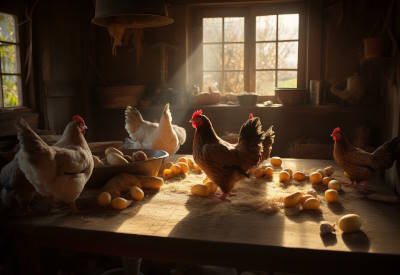
Understanding Chickens’ Dietary Requirements
Our feathery friends, the chickens, aren’t just clucking around aimlessly. They have a complex dietary system that needs to be understood and respected to maintain their health and vitality.
Basic Nutritional Needs of Chickens
Chickens, much like humans, require a balanced diet to thrive. They need a rich mix of protein for muscle development, carbohydrates for energy, vitamins and minerals for bone health and immune system support, and water, which makes up about two-thirds of a chicken’s body.
How Chickens Digest Food
Chickens possess a unique digestive system. Lacking teeth, they swallow food whole, and it travels to their crop, a storage unit of sorts. From there, food moves to the gizzard, a powerful organ that grinds it down, before the nutrients are absorbed in the intestines.
Essential Food Groups for Healthy Chickens
Layer pellets, mixed corn, greens, and fresh fruits are typical staples in a chicken’s diet. However, it’s fun to give them a tasty treat now and then. Which raises the question: Can chickens eat cheese?
[ChickenAffiliate]
Overview of Cheese as Food
Let’s understand this food type better before determining if our feathered pals can consume cheese.
Cheese Production Process
Cheese is a product of the fermentation of milk. Bacteria are added to milk to convert lactose into lactic acid, followed by rennet to curdle the milk. The curds are then processed and aged to produce cheese.
Nutritional Composition of Different Types of Cheese
Cheeses vary widely in their nutritional makeup, but generally, they’re rich in protein, calcium, and fats. They also contain a small amount of carbohydrates, primarily lactose, the sugar naturally found in milk.
Potential Health Benefits and Risks of Cheese
For humans, cheese is a valuable source of protein and calcium, but it also carries risks, such as high saturated fats and sodium content. However, do these benefits and risks translate to chickens?
Can Chickens Eat Cheese? A Closer Look
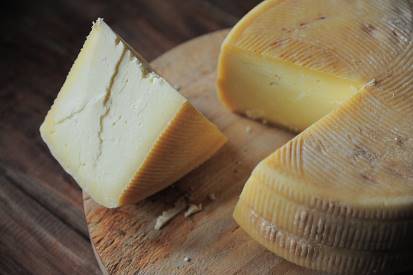
Let’s explore whether chickens can indulge in a cheesy treat.
Understanding Lactose Tolerance in Chickens
Like many birds, chickens have a lower lactose tolerance than mammals. As a result, consuming large quantities of lactose-rich foods like cheese can potentially cause digestive problems for them.
Potential Benefits of Cheese for Chickens
Despite the potential drawbacks, cheese does contain beneficial nutrients. The high protein content can support their muscle growth, and calcium can help build strong eggshells if you’re raising layers.
Risks and Drawbacks of Feeding Chickens Cheese
The key risks are primarily due to lactose and high-fat content. Lactose may cause digestive issues, and excessive fats can lead to obesity and related health problems.
Practical Tips for Feeding Cheese to Chickens
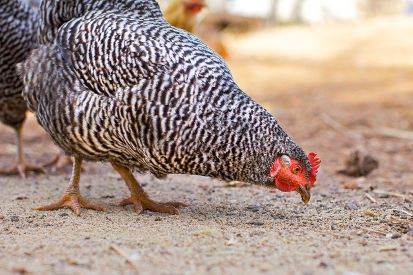
If you decide to treat your chickens to some cheese, it’s crucial to do it responsibly.
Best Types of Cheese for Chickens
Low-lactose cheeses, such as mature cheddar or Swiss cheese, are better options for chickens. These cheeses undergo a maturing process that breaks down most lactose content.
How Much Cheese Can a Chicken Eat?
When it comes to cheese, moderation is vital. Cheese should be given as a treat and should not replace their regular diet. A small piece per chicken a few times a week should be safe.
Cheese as a Treat vs. Regular Part of Diet
Cheese should be considered a treat rather than a regular part of a chicken’s diet. Feeding chickens too much cheese can disrupt their balanced diet and lead to health issues.
Alternative Dairy Products for Chickens

If you’re wondering if other dairy products could offer a safer, nutritious alternative, let’s take a look.
The Safety of Other Dairy Products for Chickens
Products like plain yogurt or kefir, which have live cultures, could be better dairy options for chickens as the fermentation process reduces lactose content.
Health Benefits of Dairy Alternatives
Yogurt and kefir are lower in lactose and rich in probiotics, which can support digestive health in chickens. They also provide calcium, essential for eggshell production.
How to Safely Introduce Dairy Alternatives in a Chicken’s Diet
Again, moderation is key. Start with small amounts and observe your chickens for any adverse reactions. Also, ensure the products are free from added sugars or artificial sweeteners, which aren’t safe for chickens.
Experiences from Poultry Farmers
While we’ve discussed the theory, what do those on the ground think about feeding chickens cheese?
Case Studies: Real-life Experiences of Feeding Chickens Cheese
Many poultry keepers have found that their chickens enjoy cheese, and it doesn’t seem to cause any harm in moderate quantities. However, this does not replace the need for a balanced, nutritious primary diet.
Expert Opinions: What Veterinarians and Chicken Experts Say
Most experts agree that chickens can eat cheese, but only in moderation. They caution against making it a regular part of the diet and suggest closely monitoring your chickens if you choose to introduce cheese.
Community Input: Stories and Advice from Chicken Owners
Online poultry communities are full of stories and advice from chicken owners experimenting with cheese as a treat. The consensus is clear – moderation is key, and cheese can never replace the crucial nutrition from a balanced diet.
Factors to Consider when Feeding Cheese to Chickens
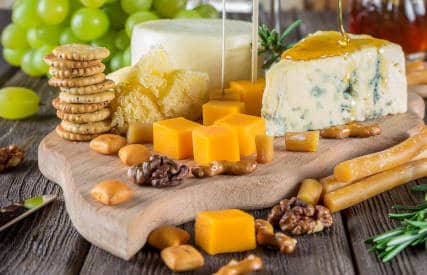
While we’ve established that chickens can eat cheese in moderation, there are several factors to remember when adding this dairy product to their diet.
Quality of Cheese
Ensure the cheese you’re feeding your chickens is fresh and mold-free. Moldy cheese can contain toxins that are harmful to chickens.
Salt Content in Cheese
Some cheeses have high salt content, which can be harmful to chickens. Choose low-sodium options if possible, or rinse the cheese under water to remove some of the salt before feeding it to your chickens.
Serving Size and Frequency
While chickens may enjoy cheese, limiting the serving size and frequency is essential. Cheese should be considered a treat, not a regular part of a chicken diet.
Monitor Your Chickens
Observe them closely after introducing cheese or any new food to your chickens. Look for any signs of digestive upset or changes in their droppings. It’s best to discontinue feeding them cheese if any adverse effects are observed.
Consultation with a Veterinarian or Poultry Nutritionist
If you’re unsure about feeding your chickens cheese or any other food, it’s always best to consult with a veterinarian or poultry nutritionist. They can provide guidance based on your flock’s specific needs and health status.
What Other Dairy Products Can Chickens Eat Apart from Cheese?
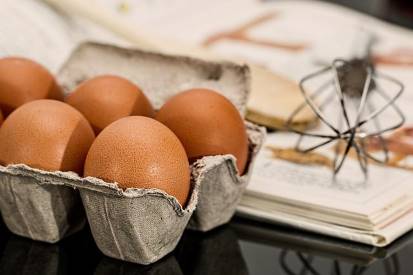
As a chicken parent, you might be curious about what other dairy products you can offer your feathered friends apart from cheese. Let’s explore a few commonly consumed dairy items and see if they’re safe for your chickens.
Eggs
Ironically, chickens can eat eggs. Cooked eggs are a fantastic source of protein and can be a healthy treat. It’s essential to serve them cooked and not raw to avoid encouraging egg-eating behavior in your flock, which can lead to chickens eating their eggs.
Read More: Can Chickens Eat Eggs? Unscrambling The Facts
Yogurt
Yogurt is a chicken-approved dairy product! It’s a good source of calcium and contains beneficial probiotics that can help with your chicken’s digestion. However, ensure it’s plain yogurt, free from added sugars or artificial sweeteners, and only feed it in small amounts as a treat.
Read More: Can Chickens Eat Yogurt? Unveiling The Benefits And Risks
Cottage Cheese
Cottage cheese is another dairy product that chickens can safely consume. It’s lower in fat and lactose compared to many other types of cheese and is a good source of protein. However, as with all dairy products, moderation is key.
Read More: Can Chickens Eat Cottage Cheese? Unraveling The Truth
Ice Cream
While the thought of your chickens enjoying a sweet ice cream treat might be amusing, it’s not the best idea. Ice cream is high in sugar and can cause digestive issues for your chickens. Plus, it’s cold, which isn’t good for your chickens’ internal temperature. So, avoiding ice cream in your chicken’s diet is best.
Read More: Can Chickens Eat Ice Cream? Debunking Myths & Healthy Alternatives
Sour Cream
Like other dairy products, chickens can consume sour cream in moderation. Its fermentation process reduces some of the lactose content, but it is still high in fats. It should be fed sparingly and should never replace the standard diet.
Read More: Can Chickens Eat Sour Cream? Unraveling The Dairy Dilemma
Can chickens eat cheese – final thoughts
So, we’ve clucked and pecked our way through the delicious and slightly controversial topic of whether chickens can eat cheese. As it turns out, they can, but remember, moderation is key. Our feathered friends may enjoy a cheesy treat, but too much of a good thing can lead to unwanted health issues. Always consider the lactose content and potential fat content before treating your chickens to any dairy delight.
In essence, cheese can join the ranks of special treats for your beloved chickens, along with their usual diet of pellets, corn, greens, and fruits. But keep it to an occasional treat, and your chickens should continue to peck around happily and healthily.
